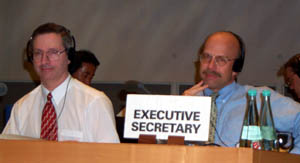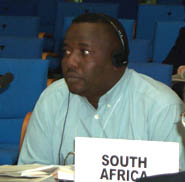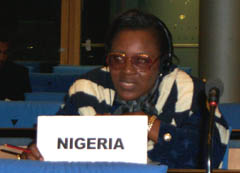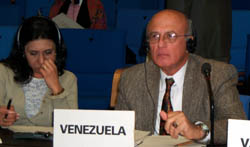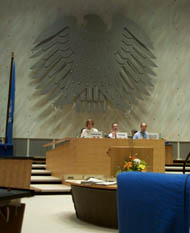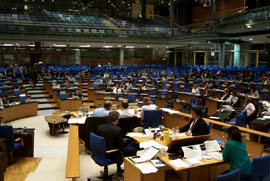 |
Final briefing:
The fourth
session of the Intergovernmental Negotiating Committee (INC-4) for an
International Legally Binding Instrument for Implementing International
Action on Certain Persistent Organic Pollutants (POPs) met from 20-25
March 2000, in Bonn, Germany. Approximately 500 representatives from 121
countries, international organizations and non-governmental organizations
participated in INC-4, and continued preparation of an international legally
binding instrument for implementing international action on certain POPs
grouped into three categories: 1) pesticides: aldrin, chlordane, DDT,
dieldrin, endrin, heptachlor, mirex and toxaphene; 2) industrial chemicals:
hexachlorobenzene (HCB) and polychlorinated biphenyls (PCBs); and 3) unintended
byproducts: dioxins and furans.
Contentious
issues at the center of debate at INC-4 were measures to reduce or eliminate
releases, technical assistance, and financial resources and mechanisms.
While INC-4 succeeded in drafting articles on technical assistance and
financial resources and mechanisms, these text are heavily bracketed and
positions between developing and developed countries on these topics remain
isolated. Delegates also devoted much time to addressing control measures
(Article D) and made some headway on how to handle elimination language,
particularly with respect to by-products. INC-4 also addressed and made
progress on articles on: national implementation plans; listing of substances;
information exchange; public information, awareness and education; and
research, development and monitoring. INC-4 was unable to allow adequate
time for discussion on preamble, objective and definitions, leaving these
articles to INC-5.
|
Report
of the drafting group on Article D(1) and D(2)
|
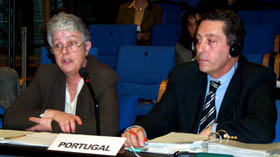  The
EU stressed the importance of addressing trade between parties as
well as trade with non-parties. He outlined the EU proposal,
which addresses: import; export before complete prohibition and
use among parties; export after complete prohibition; and export
to non-parties. He regretted that the EU's proposals on non-parties
were not included in the contact group's proposed text on procedural
grounds, requested the Secretariat to include the proposals in the
compilation of draft articles of the convention, and insisted the
issue be placed on the INC-5 agenda. The
EU stressed the importance of addressing trade between parties as
well as trade with non-parties. He outlined the EU proposal,
which addresses: import; export before complete prohibition and
use among parties; export after complete prohibition; and export
to non-parties. He regretted that the EU's proposals on non-parties
were not included in the contact group's proposed text on procedural
grounds, requested the Secretariat to include the proposals in the
compilation of draft articles of the convention, and insisted the
issue be placed on the INC-5 agenda. |
|
|
*
To view PDF files, you will need the free Adobe Acrobat Reader:

|



